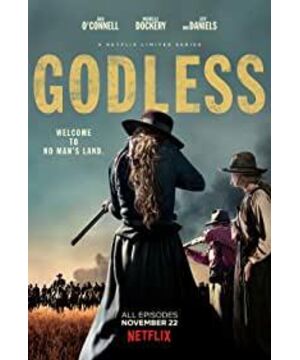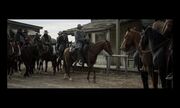I watched this show to watch the performance of actress Michelle Dockery, and Western was only a cowboy symbol for me and the not-so-pure impression of HBO Western World. I stay on the subject of prejudice, and feel that the themes discussed in this type of film and television cannot be particularly common (it is indeed classified as a "limited drama"), and western cowboys are no longer novel. Facts have proved that Western movies are a bit similar to the martial arts of the American nation, in which the feelings are like sea, it is too easy to impress people. At least the look and feel of this film is epic; the producer is aesthetically perfect in the story.
To be honest, Michelle Dockery's various looks and postures have her deep personal imprint, but she can't be regarded as the first highlight of the show. (Of course, this criticism is based on my understanding of her other works. If I see her for the first time in this show, I will still be amazed.) Her role itself is very powerful, but the space for presentation is limited. The ladies in La Belle are as wonderful as the hostess. Quite beautiful group play. The male characters are also great. My favorite is the single-handed middle-aged crisis sheriff line. The introduction of Indian ghosts is very magical.
The highlight of "A God" lies in its narrative, its aesthetic perception, degree of completion, etc. It can be said that it is good because it is a perfect whole. There is an intuitive thing that makes me feel extremely comfortable, that is, there is always a casual and well-designed anti-symbolic spirit in the play. Maybe from the beginning of the movie, your eyes are full of symbols-the silhouette of a woman, a bloody violin, a rope twisting the head... I think it is more appropriate to treat them as beads of the plot here. Meaning is directly linked to plot, but it is not the inner core. What keeps a drama in the memory for a long time is the things that remain after the plot is removed, and it is some details and metaphors. So what can be called a symbol is the cross—God, Frank's death prediction, and Bill's shadow. In the story, none of these three have reached the symbol of consummation—the existence of God is still specious, Frank did not die as he had predicted, and Bill's shadow does not correspond to the relevance of his fortune—all these are meaningless offenses. This kind of frustration seems to be a kind of incompleteness, but I saw a certain height of arrival in the helpless silence and helplessness. This is common in literature, but it is rare in film and television dramas. Not all follow-up questions can be answered. Rather than piece together a clichéd preaching, it is better to let the answer drift in the wind and open it to everyone.
The theme of the story no longer wants to dig deeper. It's a pity that God's imagery cannot arouse due deep thought in my non-religious people. I like Frank's anti-fateful ending. He is an absent-minded man who always held Christ tightly, but was eventually abandoned by God. And Roy, who had the appearance of killing God at first, finally got the prayer of Goddess. The so-called godlessness may be for the defeated.
Forgive me for discussing so much in the technical field. In fact, it is difficult for me to express my emotions in this drama, because the emotions in it are unspoken and magnificent. It allows you to breathe more comfortably and let your soul. Take a soothing pain once in a while, instead of making your eyes burst into tears.
View more about Godless reviews











